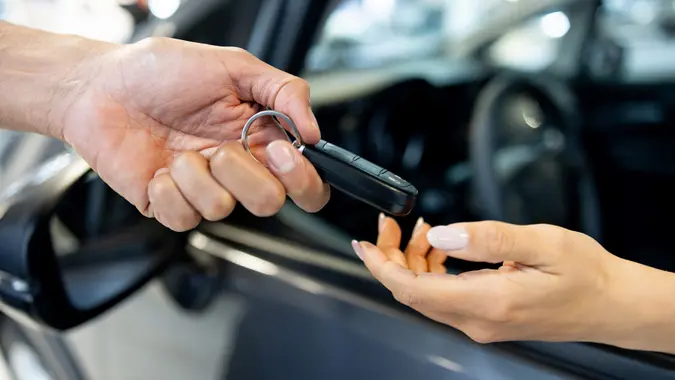6 Situations Where You Should Lease a Car Instead of Buying, According to an Expert

Commitment to Our Readers
GOBankingRates' editorial team is committed to bringing you unbiased reviews and information. We use data-driven methodologies to evaluate financial products and services - our reviews and ratings are not influenced by advertisers. You can read more about our editorial guidelines and our products and services review methodology.

20 Years
Helping You Live Richer

Reviewed
by Experts

Trusted by
Millions of Readers
For years, conventional wisdom has said buying a car is always the smarter financial move. But with high prices, rising loan rates and tighter household budgets, that’s not always true. In some cases, leasing could make more sense for many drivers, especially those who value lower payments, flexibility and fewer repair surprises.
According to Scott Kunes, COO of Kunes Auto and RV Group, here are six times when leasing a car may be smarter than buying.
1. You Need a Lower Monthly Payment
Leasing can be the smarter play “when you want a lower monthly payment on a new, warranty-covered car and you drive predictable, moderate miles,” Kunes said.
With loan APRs still on the higher side, leasing helps you hang onto more of your money upfront instead of tying it up in a down payment or long loan. “As I often tell customers, leasing gives you options, not obligations,” Kunes said.
To capture the full picture of buying versus leasing a car, he urged, “Zoom out and look at everything.” For a lease, this includes “drive-off amount,” which is your upfront cost at signing, usually covering the first month’s payment, a security deposit and fees, plus monthly payments, maintenance, insurance and end-of-term costs.
2. You Have Short-Term Needs
Lower lease payments can translate into real savings if you minimize upfront costs and avoid fees for mileage and wear and tear in the short term, Kunes explained.
“In that case, you’re paying just for the vehicle’s depreciation during your lease term. But if you keep cars for many years or put on higher mileage, buying is usually more cost-effective over time.”
3. Interest Rates Are High
With vehicle prices still high and loan rates near 7% on new cars, leasing can relieve the payment burden because you’re financing only the depreciation, not the entire car, Kunes explained.
“As manufacturers adjust residuals and incentives, those savings can shift quickly, so it’s important to work with a trusted dealer who can help you make the right decision based on your car buying needs and financial situation,” he urged.
4. You Have a Tight Budget
If your budget is tight or your income variable, leasing can help buyers stay in a new vehicle without draining savings or taking on a high-interest used car loan, Kunes said. “Because most leases cover the car during its warranty period, you limit maintenance costs and preserve cash flow for other financial priorities.”
5. You’re Building Long-Term Wealth
If you’re focused on building long-term wealth, a good rule of thumb is to own your appreciating assets and lease your depreciating ones, Kunes shared. Thus, leasing can make sense when preserving cash flow and limiting repair risk are higher priorities than building equity.
“If your goal is to grow net worth, owning a reliable car and keeping it well past the payoff period usually comes out ahead,” Kunes said, noting that you’re more likely to hear that from a financial advisor than a car dealer.
6. Only After Adding Up the Costs
Be sure you add up the costs for each option, Kunes said, including upfront costs, monthly costs, insurance, maintenance and any end-of-term or resale costs and compare the totals over the same time frame.
“If the lease total is within roughly 10% of owning, and you value flexibility and lower repair risks, leasing makes sense. If the gap is wider, or you plan to keep the car long after it’s paid off, buying usually comes out ahead.”
Additionally, negotiate the vehicle price first, then confirm the money factor and residual values. “Keep your drive-off low, set realistic mileage limits and verify all fees up front, especially acquisition and disposition charges, to avoid surprises later,” he said.
Most important: Always ask for a complete breakdown before signing anything.
 Written by
Written by  Edited by
Edited by 

























